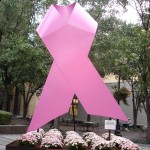 As one of the most popular posts of 2011, we feel the need to emphasize this topic and are therefore re-visiting this subject.
As one of the most popular posts of 2011, we feel the need to emphasize this topic and are therefore re-visiting this subject.
Breast Cancer awareness should not be limited to the month of October. Pink ribbons are the constant reminder that breast cancer affects one in every eight woman at sometime during their life. This is a horribly high statistic and it’s clear from research done by BreastCancerFund.org that the challenges woman face to stay healthy are many.
Our food, water and lifestyles are fraught with chemicals and this bombardment wreaks havoc on our immune and endocrine systems. The overload of estrogen mimicking chemicals in our modern world causes estrogen dominance which perpetuates into hormone imbalances and eventually malignant cells.
This article, written by a guest blogger, originated in the NY Times Science section, and shows that living a healthy life style can actually decrease your cancer risk. Chinese Herbs have been used for decades to help with diet, digestion and weight loss. If you struggle with maintaining a normal body weight, I highly recommend digestive enzymes and Chinese herbs to your daily routine for proper digestion and restful sleep. Sleep rejuvenates your body and provides the vital energy that you may otherwise try to compensate for with extra food. (See this article on how restorative sleep can improve weight loss)
by Kath Bartlett MS. L.Ac. – Ashville, NC
Obesity dramatically increases a woman’s risk of developing breast cancer by 50-100%, the risk increasing “the older the woman gets and the longer she remains obese.” (1) The reason being is that the abdominal fat cells convert steroid (fat soluble) hormones to estrogen. In the breasts, the additional estrogen created binds to the breast cells, promoting “cell division and potentially tumor growth.” (2) Cancer cells are abnormal cell growth: the additional cell division cause the tumor growth. Adipose tissue (fat) contains an enzyme, aromatase, that converts steroid hormones into estrogen. After menopause, the ovaries and pituitary gland are no longer signaling for estrogen production through the monthly menstrual cycle. To compensate, the amount of aromatase in the adipose tissue increases to step up estrogen production. Obese women have higher levels of estrogen production taking place in the body fat of the hips and stomach, which increases during menopause, which raises the risk of tumors developing in the breast.
“Glucose [blood sugar] is the preferred substrate for cancer cells. . . [In a study] mice injected with aggressive mammary [breast] tumors were placed on 3 diets. After 70 days 95% of the mice on the low-sugar diet were alive. Of the mice on the moderate-sugar diet 67% were alive. And only 33% on a high-sugar diet were alive. Also ‘moderate’ alcohol consumption is associated with elevation in the risk for breast cancer from 50-100%.” (3)
Phytoestrogens have a chemical structure similar to estrogen. They bind to the receptor sites on the breasts, preventing the body’s estrogen from binding and causing tumor cell growth. The phytoestrogens that bind to the breast cell estrogen receptor sites have a weaker influence on breast cell production, so that it is less likely that tumors will form. Common food sources of phytoestrogens include: soy (tofu, tempeh, miso), flax and raw pumpkin seeds, clover and mung bean sprouts. Avoid powdered soy concentrate, these have caused some to develop Hashimoto’s thyroid disease. (4)
Studies have shown that phytoestrogens increase the effectiveness of breast cancer treatments. Borage oil has shown to decrease the growth of breast cancer cells. (5)
Eating an organic diet, and limiting exposure to chemicals, including household cleaners, detergents, pesticides, food packaging (plastics leach into foods, especially when warm foods are put into plastic containers) is also important to reduce cancer risk. Chemicals and pesticides can change the DNA of cells, causing them to mutate into cancer cells. Studies have shown higher levels of pesticides and pollutants in fat and blood of women with breast cancer than in healthy women.
1-6. Lahans, T. Integrating Conventional and Chinese Medicine in Cancer Care. Elsevier 2007; 92-102.

